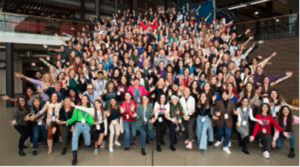Research in AI is an increasingly exciting and fast-paced environment, with many new interesting features and applications available at a wider scale. However, it is also the topic of heavy criticism for often failing to represent and serve minority groups, which have historically been underrepresented in conversations about technology. Being PhD students in the CDT in NLP, we think it is extremely important to keep up with issues regarding equality, diversity and inclusion (ED&I), both to improve our own work but also to be critical about new advancements in the field.
Because of that, we are currently hosting a reading group in ED&I once a month, open to all postgraduate students and staff from the School of Informatics.
Anyone involved can choose a paper which they think is of interest, no matter whether it is their own work or not. Although attendees are encouraged to read the paper beforehand, this is not a requirement as we start with a ~15 min presentation. Afterwards, an informal group discussion follows, which allows everyone to comfortably express their ideas and ask questions. For the past few months, the sessions have had a very friendly atmosphere and we have learned a lot from each other about how to be more mindful researchers.
Through the ED&I reading group, we’re hoping to raise some awareness on how issues relating to equality, diversity and inclusion can impact current AI research, but also how AI research can have consequences in areas which have a direct or indirect impact on society. We also aim to foster a welcoming and inclusive environment where researchers can share and discuss their ideas on how AI research is impacting our society. We hope that attendees leave with thoughts on how their choices as a researcher can make a difference for people who have often been left out of the conversation about AI and how their choices can change that.
From the past few sessions, we have learned a lot from all the people who have presented and whom we have shared a discussion with! Our past sessions have covered:
- Everyone has an accent by Nina Markl and Catherine Lai: a review on how “accent” and “accented” terminology is currently being used in speech research, inviting to be more mindful about terminologies being used.
- Exploring Sources of Racial Bias in Automatic Speech Recognition through the Lens of Rhythmic Variation by Li-Fang Lai and Nicole Holliday : A study on how African American voices is under-recognised consistently by Automatic Speech Recognition systems and how this could be caused by differences in speech rhythm between Black and White American speakers of English.
- Stereotypes and Smut: The (Mis)representation of Non-cisgender Identities by Text-to-Image Models by Eddie L. Ungless, Björn Ross, and Anne Lauscher: A study on how large image models such as DALLE and Stable Difussion (mis)represent non-cisgender identities, and proposed solutions to the problem.
Our next session will be on Tuesday 30th April and will be covering issues related to the use of deep learning to identify transgender and gender diverse patients from electronic health records (A deep learning approach for transgender and gender diverse patient identification in electronic health records).
With AI being an exciting and constantly evolving area of research, we believe that issues of equality, diversity and inclusion are more important than ever for researchers to be aware of, even if their own topic of research is not directly linked to them.
If you are a researcher at the School of Informatics, we hope you’ll join us the last Tuesday of every month from 1-2pm for engaging presentations and fruitful discussions. Let’s all learn from each other! We usually meet in G.03, with the exception of 30th April, where we will meet in IF 1.15.
Artemis and Ariadna
Subscribe to inf-edi-reading-group@mlist.is.ed.ac.uk for notifications on next sessions


